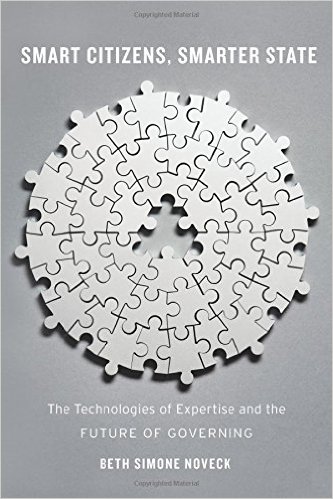Book Review: Smart Citizens, Smarter State: The Technologies of Expertise and the Future of Governing by Beth Simone Noveck
How can we increase public participation in governance? In Smart Citizens, Smarter State: The Technologies of Expertise and The Future of Governing, Beth Simone Noveckargues that institutions should develop new technologies of expertise in order to better utilise the skills and experiences of citizens. Zeynep Engin strongly recommends this book for those looking to understand how technological developments can enable governance to become more participatory as part of the new trends in public decision-making.
Smart Citizens, Smarter State: The Technologies of Expertise and The Future of Governing. Beth Simone Noveck. Harvard University Press. 2015.
 When Beth Simone Noveck recently visited London to launch her book, Smart Citizens, Smarter State: The Technologies of Expertise and the Future of Governing, at a series of events, it was not a big surprise to see huge crowds and top-level interest from academics, civil servants and politicians. The former leader of President Obama’s Open Government Initiative, the current Commissioner for the Global Commission on Internet Governance for the UK and the co-founder and director of The Governance Lab (NYU and MIT Media Lab), Noveck insightfully takes advantage of her unique global position to introduce a comprehensive picture of how governments make policies today. The book provides historical context to describe the ‘rise of the professional government’ and the ‘limits of democratic theory’, followed by the current developments of, and new horizons for, governance in the twenty-first century.
When Beth Simone Noveck recently visited London to launch her book, Smart Citizens, Smarter State: The Technologies of Expertise and the Future of Governing, at a series of events, it was not a big surprise to see huge crowds and top-level interest from academics, civil servants and politicians. The former leader of President Obama’s Open Government Initiative, the current Commissioner for the Global Commission on Internet Governance for the UK and the co-founder and director of The Governance Lab (NYU and MIT Media Lab), Noveck insightfully takes advantage of her unique global position to introduce a comprehensive picture of how governments make policies today. The book provides historical context to describe the ‘rise of the professional government’ and the ‘limits of democratic theory’, followed by the current developments of, and new horizons for, governance in the twenty-first century.
As a researcher with a keen interest in linking machine learning and statistics tools to social science and public policy, it was an enhancing experience for me to read about how ‘governance’ was changed in parallel to the standardisation of measures as the new tools for controlling social conditions and the rise of professional training in universities after the mid-nineteenth century. Noveck describes how these developments shaped the modern design of political institutions and public decision-making, which ultimately made ‘professionalism key to the legitimacy of government actions and public participation the exception rather than the rule’.
Smart Citizens, Smarter State is mainly devoted to challenging contemporary political theories by focusing on new procedures and tools to attract and involve citizen participation in everyday governance. Going beyond the existing practices that are ‘deeply distrustful of citizens and their abilities’ in formal decision-making processes, Noveck convincingly argues that the future will have to be very different. The culture of decision-making that is ‘top-down in orientation, unnecessarily complex, and lacks the mindset or skillset for experimentation’ will eventually have to adapt to, if not be fully replaced by, bottom-up mechanisms in ways that the commercial sector is very much taking advantage of today.

Credit: floeschie, CC BY 2.0
At the time of writing, an online petition to ‘make it illegal for a company to require women to wear high heels at work’ had already gone beyond the 100,000 signature threshold in just two days after a woman was sent home for refusing to wear high heels in her workplace. The UK Parliament will now consider the issue for a debate. More obvious examples in recent years have also emerged from the Occupy movement and the ‘Twitter-fueled Arab Spring movement’ in multiple nation states, clearly demonstrating the power of new technologies that allow public voices to be heard behind the closed doors of policymakers beyond the occasional act of voting every four/five years. With reference to these current trends, I believe the following lines from Noveck best describe the new key challenge at this stage:
Occupy noticeably lacked managerial control of the kind that political parties, unions, bureaucracies and companies have depended on. To the surprise of most, these protest movements were nevertheless effective at capturing the public imagination […] But after the spring comes the fall. Technologies like Twitter and Facebook were well suited to complaining about government, expressing moral outrage, sharing information, and coordinating protests, both physical and virtual. They did not and do not provide the infrastructure for governing itself […] Social media activists have made effective use of technology to marshal supporters but have yet to learn how to convert that energy from challenging power into changing it.
Noveck promotes experimentalism as a response to what she calls ‘our design challenge’ of finding new forms of citizen engagement in government policy-making. ‘The availability of new tools (technologies of expertise) are making it possible to match the supply of citizen expertise to the demand for it in the government’, she writes, providing a comprehensive reasoning as to why this may require a complete rewriting of the legislative framework that regulates existing processes. She points out that beyond traditional credentials (for example, university degrees and membership of professional bodies), we now have the opportunity to describe expertise in other formats (lived experience, specific skills, location, etc) that may be more useful for many contemporary problems. What we need at this point is the scientific method to enable transition ‘from faith-based decision making to evidence-based decision making’.
The key terms that I believe best describe the spirit of the book emerge as ‘targeted expertise’, ‘crowdsourcing’, ‘experimental governance’ and ‘citizen engagement’. Instead of the traditional advisory committee model that mainly relies on stakeholder representation (missing the epistemic value of committee membership) and typically produces a report or a set of recommendations over months or even years, Noveck suggests that new technologies should allow us ‘to make consultation on a day-to-day basis and to strive for constant conversation with an engaged and knowledgeable public’. Going beyond ‘crowdsourcing widely to crowdsourcing wisely’ to match the right experts to the right opportunities on a large scale is more likely to lead to faster and better decision-making. Modes of expert engagement can be accommodated at all stages of ideation, discussion, formulation and assessment as opposed to limiting public participation to consultation on pre-formulated drafts of ‘professional policy-makers’ in government departments. This would also lead to redefinition of ‘the public service and the public servant as the steward of such a conversation’. The challenges with this type of engagement and potential strategies to overcome them are also covered widely.
Noveck cites a huge body of literature, encompassing a broad range of resources from key research publications to government documents, and links to websites that could significantly help anyone planning to enter into this field. She also provides a rich overview of the existing online expert networking platforms in various sectors, such as HeyPress, GradBerry,CyberCompEx, VIVO, EgoSystem, Health Tap and GitHub, and insights into the working principles of larger companies like Facebook, Google, Twitter, LinkedIn, eBay and Amazon, giving a strong base for how an expert networking strategy might be developed to increase government efficiency. In the chapter ‘Experimenting with Smarter Governance’, she explains the development of Project Aristotle of the US Air Force Lab, the UK’s Behavioural Insights Team (or ‘The Nudge Unit’) advising the government on the use of randomised controlled trials (RCT), The Tobin Project, the US Food and Drug Administration (FDA) Experts.gov andHarvard Catalyst Profiles. Through this, she reaches a framework identifying the key important questions that empirical experiments can provide answers to and formulating potential research agendas along those lines. Readers are also provided with a representative collection of recent applications to illustrate the crowdsourcing of ideas, opinions, funds, tasks and data-gathering processes in the policy context.
In the chapter ‘Bringing Smarter Governance to Life’, Noveck starts with the background of the ‘Brain Trust’ as a diverse group of creative thinkers that counselled President Roosevelt when developing a response to the Great Depression, focusing on its more important role ‘to debate, develop, solicit and refine policy’. She then describes how an ultimate twenty-first century ‘Brain Trust’ could be developed through more efficient use of technology ‘to unlock three kinds of knowledge: expertise within government, credential expertise outside of government, nontraditional forms of distributed know-how’, leading to a more democratic system for citizen-government engagement. Noveck adds that:
the recognition of citizen expertise does not mean jettisoning the professionals and substituting some kind of web-based plebiscite – far from it. Making good use of citizen expertise will require even better trained managers and leaders. This new breed of professional – if we can call it that with a wink and a nod – will need to know how to work and talk and decide with citizens rather than for them…
I strongly recommend Smart Citizens, Smarter State to the new generation of scientists emerging at the interface of computing and public policy. Those with technology and ‘hard’ sciences backgrounds would hugely benefit from a comprehensive understanding of government and policy domains in order to set new research agendas with significant potential for wider impact. At the other end of the spectrum, those with politics and social science backgrounds would find it very helpful for understanding the current technologies of expertise and the new trends in public decision-making, offering great promise for transforming the ways that governments should operate under the ongoing data revolution.
—
Note: This review gives the views of the author, and not the position of the Democratic Audit blog, or of the London School of Economics. It originally appeared on the LSE Review of Books. Please read our comments policy before posting.
—
Zeynep Engin is the Founder and Lead Investigator of Data for Policy, an independent initiative to promote interdisciplinary and cross-sector discussion for more efficient use of data in policy-making processes. The inaugural conference was held at the University of Cambridge in 2015, and the initiative receives further support from many prominent institutions, including the European Commission, London School of Economics, Imperial College, Office for National Statistics, Royal Statistical Society and other key stakeholders. Zeynep is also a Policy Fellow at the Centre for Science and Policy, University of Cambridge, and affiliated with the Department of Computer Science at University College London as an Honorary Senior Research Associate. She holds a PhD in statistical pattern detection from Imperial College London.





 Democratic Audit's core funding is provided by the Joseph Rowntree Charitable Trust. Additional funding is provided by the London School of Economics.
Democratic Audit's core funding is provided by the Joseph Rowntree Charitable Trust. Additional funding is provided by the London School of Economics.
Book Review: Smart Citizens, Smarter State: The Technologies of Expertise and the Future of Governing https://t.co/PH2hXcSdg8
@democraticaudit book review- Smart Citizens, Smarter State: The Technologies of Expertise & The Future of Governing https://t.co/C6BTc8jQFP
Review: Smart Citizens, Smarter State: The Technologies of Expertise & the Future of Governing by Beth Simone Noveck https://t.co/NzZUlKo3dk
#BookReview: Smart Citizens, Smarter State: The Tech of Expertise & the Future of Governing https://t.co/6LZpwrCQJU https://t.co/VzWerXyhei
Book Review: Smart Citizens, Smarter State: The Technologies of Expertise and the Future of Governing by Beth Noveck https://t.co/19emRthSII
@Gianlucamisu https://t.co/uCRwQgybwW
Book Review: Smart Citizens, Smarter State: The Technologies of Expertise and the Future of… https://t.co/elurqvSVNq https://t.co/cKdqXJ9zVG